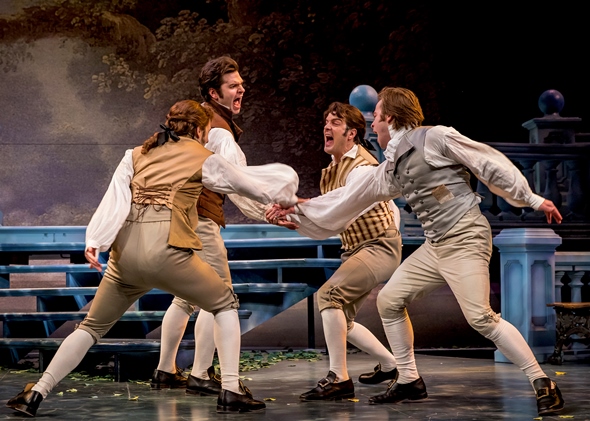‘Love’s Labor’s Lost’ at Chicago Shakespeare: Delectable comedy made clear, biting and dark
“Love’s Labor’s Lost” by William Shakespeare, at Chicago Shakespeare Theater through March 26. ★★★★★
By Lawrence B. Johnson
Chicago Shakespeare Theater’s new production of the Bard’s “Love’s Labor’s Lost” is a joyous voyage of discovery, a comedic delight that strips away the thicket of a problematic play and leaves us with the bare sober truth of human folly.
No labor is lost in this enterprise. Deftly edited and wittily directed by Marti Maraden, it brings together an acting ensemble so well integrated that the whole rollicking night feels like the work of a practiced improv troupe.
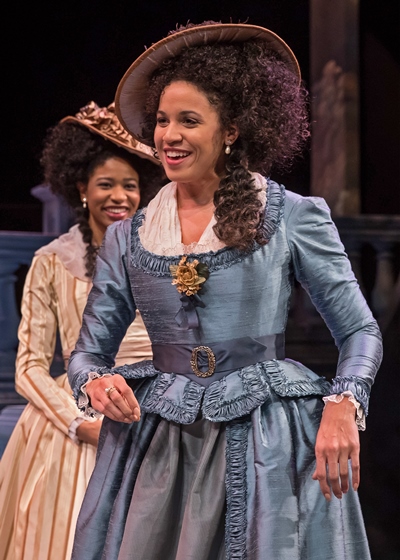 Historically, even the odd-looking title of this thorny romp has inspired consternation. The title, like the famously dense and often arcane text, probably could use an editing touch: It could just as well read “Love’s Labor Lost,” which would frame its meaning unequivocally. But there we have it, that intransigent contraction “labor’s.” Hence, love’s labor is lost. Or I suppose it could be “Love’s Labors Lost.” And indeed it is, they are. Apparently, Shakespeare produced a redeeming sequel, “Love’s Labor’s Won,” but it’s lost.
Historically, even the odd-looking title of this thorny romp has inspired consternation. The title, like the famously dense and often arcane text, probably could use an editing touch: It could just as well read “Love’s Labor Lost,” which would frame its meaning unequivocally. But there we have it, that intransigent contraction “labor’s.” Hence, love’s labor is lost. Or I suppose it could be “Love’s Labors Lost.” And indeed it is, they are. Apparently, Shakespeare produced a redeeming sequel, “Love’s Labor’s Won,” but it’s lost.
“Love’s Labor’s Lost” is among Shakespeare’s relatively early plays, probably written in 1594-95 just ahead of “Romeo and Juliet” and about a year before “A Midsummer Night’s Dream,” with which it shares the key feature of a little play given within the play by a group of amateurs. The difference in the way these hapless but earnest offerings are received by their noble audiences is crucial in the outcome of “Love’s Labor’s Lost” – or so it appears most persuasively in Maraden’s account.
In this well-tuned streamlining, what remains uncompromised is the play’s lyric poetry, which pours forth in such abundant richness that no ear could assay the sum of it in a single hearing. “Love’s Labor’s Lost” stands amid the peak experiences of the current Chicago theater season; its lengthy run offers the possibility of seeing it twice, with greater rewards a certainty in the reprise.
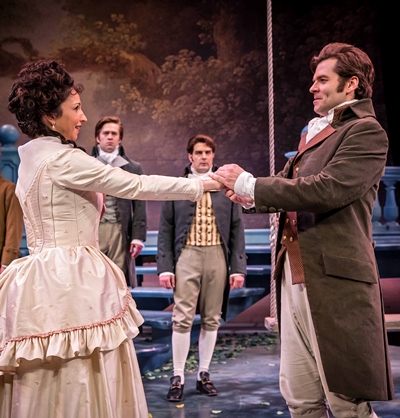 The gist of the play is that Ferdinand, the youthful King of Navarre, has resolved to forswear love – as well as proper sleep and satisfying meals – for three years during which he will study philosophy and otherwise nourish mind and soul. Women will not be allowed within a mile of court. Misery loving company, he has induced three young lords to take the pledge with him. No sooner have they so vowed, however, than the beautiful young Princess of France, accompanied by three comely ladies in waiting, arrives to deal with a political matter. Comedy ensues.
The gist of the play is that Ferdinand, the youthful King of Navarre, has resolved to forswear love – as well as proper sleep and satisfying meals – for three years during which he will study philosophy and otherwise nourish mind and soul. Women will not be allowed within a mile of court. Misery loving company, he has induced three young lords to take the pledge with him. No sooner have they so vowed, however, than the beautiful young Princess of France, accompanied by three comely ladies in waiting, arrives to deal with a political matter. Comedy ensues.
The lads are gamely played by John Tufts as the King with Madison Niederhauser, Julian Hester and Nate Burger as his fellows in ill-timed abstinence. In a curious wrinkle, it is not the King to whom Shakespeare gives comedic preeminence, but rather the courtier Berowne: Burger in a performance of infectious energy, desperate urgency and tumbling wit. All of the boys are instantly smitten, though for a time each keeps up the appearance of solemn virtue lest he be censured by the others.
The moment of shared confession comes in the play’s most brilliant episode, often referred to as the “library scene” though staged here on designer Kevin Depinet’s attractive and spacious courtyard set. One by one, the love-struck guys wander in, reading verses they’ve written for the selected apple of their eye – the King for the Princess, of course, and each lord for a lady. But then as each hears another fellow entering, he hides his treatise and himself, and spies on the next chap’s apostrophe to his love. Soon the game’s up for them all, and there’s nothing to be done but plot an assault on the ladies’ encampment – under cover of disguise.
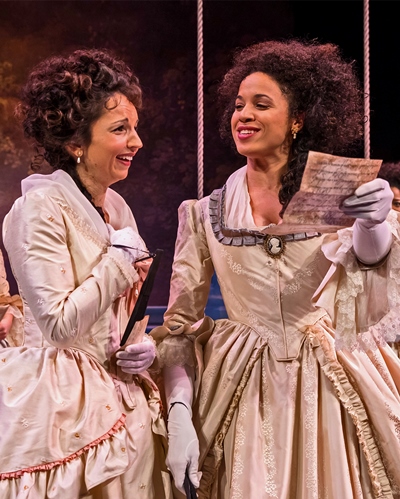 Thus this foursome of high-born men morphs before our eyes into a gaggle of pathetic clowns got up like Muscovites to woo their ladies without giving themselves away. Well, the damsels see that coming from literally a mile off and they’re ready. Here, they were a quartet worthy of their adversaries: Jennie Greenberry as the poised and circumspect Princess, with attendants portrayed by Jennifer Latimore, Laura Rook and – standing in adroitly for an indisposed player on opening night – Leryn Turlington.
Thus this foursome of high-born men morphs before our eyes into a gaggle of pathetic clowns got up like Muscovites to woo their ladies without giving themselves away. Well, the damsels see that coming from literally a mile off and they’re ready. Here, they were a quartet worthy of their adversaries: Jennie Greenberry as the poised and circumspect Princess, with attendants portrayed by Jennifer Latimore, Laura Rook and – standing in adroitly for an indisposed player on opening night – Leryn Turlington.
Attendant and chaperone to the ladies is the droll and ever observant Boyet, played to his wry pith by James Newcomb.
As in “A Midsummer Night’s Dream,” the royal amours are beset by the more earthy comedy of assorted commoners, whose errant interaction with their betters creates detours and confusion.
Alex Goodrich is a marvelous lug as Costard, a young rustic with a big heart and a good nose for the path of least resistance. David Lively makes a winning Holofernes, a doddering old scholar faithfully attended by Greg Vinkler’s sycophantic curate Sir Nathaniel.
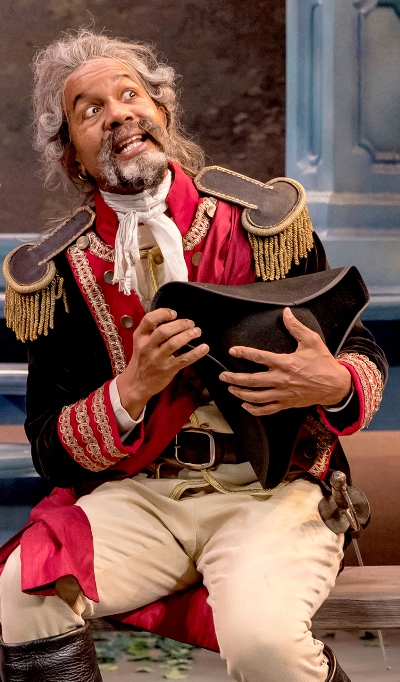 Then there is Allen Gilmore’s show-stealing turn as Don Adriano de Armado, an ancient Spanish dandy who spews loquacious conceits – like some puffed-up Don Quixote who lacks only windmills for jousting. In his service as the little page Moth is the assured young actor Aaron Lamm, who gets the saucy and waggish lad exactly right.
Then there is Allen Gilmore’s show-stealing turn as Don Adriano de Armado, an ancient Spanish dandy who spews loquacious conceits – like some puffed-up Don Quixote who lacks only windmills for jousting. In his service as the little page Moth is the assured young actor Aaron Lamm, who gets the saucy and waggish lad exactly right.
So beautiful and expressive are the costumes designed by Christina Poddubiuk that I might credit them as another character in the production, in any case as a spirit that lifts and glorifies the whole affair.
“Love’s Labor’s Lost” is called that for a reason; indeed, the play ends in double darkness: The Princess is suddenly called home to France by the death of her father, and the pining men are left with the vague promise that if they’re still interested after a year has passed, all shall live happily thereafter.
It always feels like a strange ending for a comedy, like a wrenching shift into a minor key. But director Maraden applies a subtle touch that brings some point to this somber turn — by underscoring it.
At the end, when Don Adriano, Holofernes, Costard and their fellows try to present a little play to amuse the assembled royals, much as the mechanicals do in “A Midsummer Night’s Dream,” the King and his pals mock them so severely that the play can scarcely begin before the inept actors give up in despair and shame. In this staging, the French Princess — or rather Queen, with the death of her father – and her ladies reveal their dismay at such immature conduct in their faces if not in words.
The ladies’ parting lines, effectively, “Check back with us in a year,” hardly needed to be spoken. These are boys, not men. And the revels are over. Like Prince Hal become Henry V, this ascendant Princess all but tells her jejune suitor, “I know thee not, young man.” The gesture is chilling, its implicit finality unmistakable.
Related Links:
- Performance location, dates and times: Details at TheatreinChicago.com
- Preview of Chicago Shakespeare Theater’s complete 2016-17 season: Read it at Chicago On the Aisle
Tags: Aaron Lamm, Alex Goodrich, Allen Gilmore, Chicago Shakespeare Theater, Christina Poddubiuk, David Lively, Greg Vinkler, James Newcomb, Jennie Greenberry, Jennifer Latimore, John Tufts, Julian Hester, Kevin Depinet, Laura Rook, Leryn Turlington, Love's Labor's Lost, Madison Niederhauser, Marti Maraden, Nate Burger, William Shakespeare

